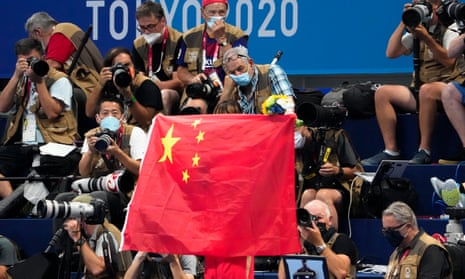Australia’s sports integrity watchdog has joined international calls for the World Anti-Doping Agency (Wada) to undertake an independent review of its processes that allowed 23 Chinese swimmers to record positive doping tests but still compete at the Tokyo Olympics.
Reports last week said the athletes were found to have traces of the banned substance Trimetazidine (TMZ) in their system in 2021.
The test results were never made public and were adjudged by the Chinese Anti-Doping Agency (Chinada) to have been caused by contamination from a hotel kitchen. Wada chose not to appeal Chinada’s findings.
The Sport Integrity Australia (SIA) chief executive, David Sharpe, has written to Wada seeking clarity around the processes performed in the handling of the case.
SIA issued a public statement on Thursday, moving to reassure Australian athletes “of the agency’s commitment to ensuring the global anti-doping system is thorough, fair and transparent”.
The move follows similar steps undertaken by UK Anti-Doping hours earlier.
SIA did not allege any wrongdoing in its statement. However, Sharpe called for clarity about how the Chinese contamination matter was handled, to retain the confidence of the athlete community.
“We need to remember not all athletes have legal training and understand the intricacies of the world anti-doping code so it is important to break this down in clear, concise facts to ensure confidence in the world anti-doping system can be restored,” he said.
Sharpe’s intervention follows growing consternation about Wada’s handling of the incident, less than 100 days from the Paris Olympics.
2018 Commonwealth Games gold medal-winning cyclist Chloe Hosking said the incident suggested “athletes are facing radically different anti-doping realities (and risks) depending on their geographical location. This is, quite simply, not fair.”
Richard Colbeck, former sport minister and Australian representative on Wada, as well as former swimmer Mack Horton have been critical of the anti-doping framework in the wake of the incident.
after newsletter promotion
Wada’s director of intelligence and investigations, Günter Younger, said this week, “with the information we have currently, we would not do anything different.”
The US Anti-Doping Agency was critical of Wada’s explanation of the incident, which included comments from Younger and the Wada president, Witold Banka.
SIA’s statement said: “Athletes in Australia and around the world need to have trust in the global anti-doping system and have confidence that all competitions are fair and that all athletes are treated fairly.”
The federal sport minister, Anika Wells, declined to comment on the matter, but the government was aware of Sharpe’s letter before it was sent.
